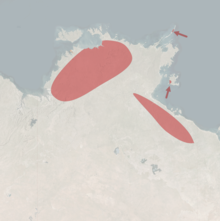| Sandstone false antechinus | |
|---|---|
| Conservation status | |
 Least Concern (IUCN 3.1) | |
| Scientific classification | |
| Domain: | Eukaryota |
| Kingdom: | Animalia |
| Phylum: | Chordata |
| Class: | Mammalia |
| Infraclass: | Marsupialia |
| Order: | Dasyuromorphia |
| Family: | Dasyuridae |
| Genus: | Pseudantechinus |
| Species: | P. bilarni |
| Binomial name | |
| Pseudantechinus bilarni (Johnson, 1954) | |

| |
| Distribution of the sandstone false antechinus | |
The sandstone false antechinus (Pseudantechinus bilarni), also known as the sandstone pseudantechinus, the sandstone antechinus, the sandstone dibbler, Harney's antechinus and the Northern dibbler, is a species of small carnivorous marsupial, which has a patchy distribution in Australia's Northern Territory.
Taxonomy
The sandstone false antechinus was discovered in 1948 when it was collected on the American-Australian expedition to Arnhem Land. It was described in 1954, when it was given the species name bilarni, which reflects the Aboriginal pronunciation of Bill Harney, an Australian writer and naturalist who accompanied the expedition.
The species has at times been assigned to the genus Antechinus, and was long believed to be a member of the genus Parantechinus. The latter genus currently contains a single species, traditionally known as the dibbler (Parantechinus apicalis) in Southwest Australia, from which this species gained a common name of Northern dibbler. Only recently the species has been moved to Pseudantechinus, where it is one of six species.
Description
It is an insectivorous species that, like many other dasyurids, so exhausts itself in the breeding season that most of the males die, although unlike some other species, about 25% of both sexes survive to a second year.
The sandstone false antechinus is partly diurnal and differs from the other members of its genus in its very long, narrow muzzle and its more greyish colour. The breeding season is May–July.
Habitat
The sandstone false antechinus is found in rocky areas around the Top End and the Gulf of Carpentaria in the Northern Territory. It also inhabits coastal rock platforms on Marchinbar Island.
References
- Woinarski, J.; Burbidge, A.A. (2016). "Pseudantechinus bilarni". IUCN Red List of Threatened Species. 2016: e.T40636A21945319. doi:10.2305/IUCN.UK.2016-3.RLTS.T40636A21945319.en. Retrieved 12 November 2021.
- ^ Woolley, P.A.; Begg, R.J. (1995). "Northern Dibbler". In Strahan, Ronald (ed.). The Mammals of Australia. Reed Books. pp. 74–75.
- ^ Menkhorst, Peter (2001). A Field Guide to the Mammals of Australia. Oxford University Press. p. 60.
External links
| Taxon identifiers | |
|---|---|
| Pseudantechinus bilarni |
|
| Antechinus bilarni | |